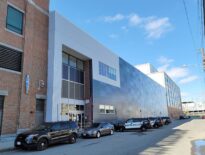
Boston’s North End will be far quieter this summer thanks to new city policies that took an ax to many of the neighborhood’s popular outdoor dining patios.
What does Boston Mayor Michelle Wu’s decision to ban outdoor dining in the North End have to do with her increasingly controversial policies on new development projects?
More than you might think.
The mayor outraged North End restaurant owners last week when she unveiled the city’s outdoor dining rules for the warmer months ahead.
Last year, the city hit restaurant owners in the neighborhood with a controversial, $7,500 impact fee for outdoor dining.
This year, outdoor dining in the North End will be effectively prohibited across much of the old quarter under new city rules, fee or no fee.
Given how low margins already are in the restaurant business, losing customers during the summer tourism season has to be a frustrating prospect for North End restauranteurs.
Meanwhile, developers are up in arms over a myriad of new policies the administration has either rolled out or is pushing that the real estate world contends will drive up the cost of building at a time when construction prices are already through the roof.
Housing developers will now be required to subsidize a fifth of all new apartments and condominiums at below-market rates, while lab projects will see a doubling of their linkage fees.
Oh yeah, and Wu is also pushing plans for bring back rent control, the very mention of which sends developers into a frenzy and spooks investors worried about future returns.
Gentler on Developers
In both cases, the mayor’s response has been to ignore the impact of her new policies on the viability of everything from North End pizzerias to new apartment buildings, and to keep forging ahead in the face of strong opposition, though with some nuances.
City officials have shown remarkably little sympathy for North End restauranteurs, following the uproar over last year’s huge fees with a pretty-much-total ban on outdoor dining this year.
The Wu administration has been somewhat gentler in its approach to the development industry, perhaps realizing that new lab, office and apartment projects are a vital cash cow for the city, generating tens of millions of dollars in new tax revenue each year.
Yet while Wu has offered an up to 10 percent cap on rents – which is relatively high – she also refuses to back down amid warnings that simply pushing rent control is on its own likely enough to scare off new development.
Privately, the attitude on part of city officials seems less than accommodating as well, with a feeling that developers are simply complaining in order to protect outsized profit margins.
The idea that some projects might not go forward because the numbers don’t pencil out doesn’t seem to be a major concern.
It’s Partly Politics
Some would simply see this as just simple antagonism towards the business community on part of an uber-progressive mayoral administration, and maybe there is some element of that.
But it’s more complicated than that. Wu’s political base is significantly different than the one that powered former Mayor Marty Walsh to two terms as mayor, and even which made the late Thomas M. Menino the city’s longest serving chief executive.
Walsh won a hard-fought contest in his first campaign for mayor with the enthusiastic backing of the labor movement, which is a strong proponent of new development and the jobs that come with it.
Menino had strong trade union support, and a solid relationship with the business community, along with a deft touch dealing with neighborhood issues.
Wu’s base, on the other hand, is in the neighborhoods, with avid support among the affluent professional classes and activists, among others.
Her dogged pursuit of progressive policies, especially as it relates to the business community and development, is certainly a crowd-pleaser.
And that’s where the votes are, not among a few restaurant owners in the North End, some of whom probably don’t even live in the city. Ditto for developers.
Danger of Left-NIMBYism?
For Wu, being mayor who champions the neighborhoods is great politics and likely meshes well with her own worldview.
But it could also – and may already be – sliding into a form of progressive NIMBYism.
After all, will this mayor’s base really be shedding tears if there is a drop in the volume of new projects getting approved and built, especially they are higher-end condos or apartments?

Scott Van Voorhis
I doubt it, especially if Wu can keep up production of affordable and subsidized apartments and condos or, or failing that, be able to claim they are a higher percentage of overall residential construction than before.
Less construction and development also mean fewer complaints from ornery neighbors and abutters.
But at the end of the day, beating the housing crunch is going to be a numbers game – we need more housing of all types.
Does Wu and her more fervent supporters believe that? The jury’s out on that one, but the signs so far are troubling.
Scott Van Voorhis is Banker & Tradesman’s columnist; opinions expressed are his own. He may be reached at sbvanvoorhis@hotmail.com.






